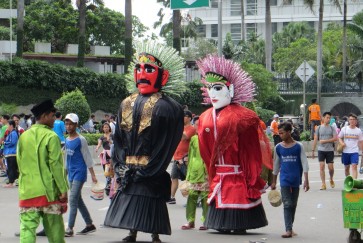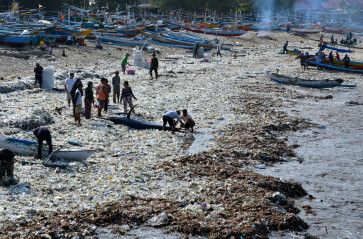Getting Personal: Dinny Jusuf: Rejuvenating Toraja’s weaving heritage
Photos courtesy of Toraja MeloDinny Jusuf comes from a family with a strong batik background
Change text size
Gift Premium Articles
to Anyone

Photos courtesy of Toraja Melo
Dinny Jusuf comes from a family with a strong batik background. Her Chinese maternal grandmother was a batik merchant in Bandung, West Java, while her paternal grandmother was a batik artisan in Pekalongan, Central Java.
Born in Bandung in 1956, she went into banking and became a women’s right activist, but she always loved collecting batik and handwoven cloth during her travels throughout the archipelago. It was her Torajanese husband, Danny Parura, who led her to fall deep in love with the weaving heritage of Toraja, the mountainous region of South Sulawesi.
Dinny worked with Citibank and later established a bank training consultancy. She was serving as secretary-general of the National Commission on Violence against Women (Komnas Perempuan) when she decided to take a break from her career in 2007.
“I felt tired. I said to my husband I want to go to your kampong and write about all things that I had encountered while working for Indonesian women,” she said at the Toraja Melo store in Kemang, South Jakarta.
The couple began constructing their house in Toraja, which gave Dinny ample time to travel around the Sa’dan district of Northern Toraja.
“One day, I walked to a kampong near the house. I saw lots of Chinese-looking babies. When I asked the locals, they said it was because the babies’ fathers were Chinese from Malaysia,” she recalled.
Dinny discovered that they were the babies of migrant workers in Malaysia, who got pregnant for one reason or another. They left the babies to be taken care of by their parents at home so they could continue to work.
“I felt that I had to do something. I had no plan. What I did was to buy several handwoven cloths from the locals. I thought that if the locals could work in their kampong, they don’t have to work abroad. This could be the solution.”
In Jakarta, Dinny shared her story and showed the handwoven cloth to her friend, Obin, a noted batik designer. Obin suggested Dinny create something out of them.
“So with the help of friends, I started making clothes and sandals from the woven cloth without having knowledge of design,” Dinny said.
In 2010, Dinny received a helping hand from her sister, Nina Jusuf, a US-based women’s rights activist who has a fashion design background.
“She came at the time when I was buried under all these handwoven bags and sandals. She said ‘You’re crazy, you don’t even have a fashion design background yet you do this. I will help you’.’”
Together, the sisters established a foundation, Yayasan Toraja Melo — which means “beautiful Toraja” — to conduct community organizing programs, and a company, PT Toraja Melo, to manage the business aspects.
“We received grants for community organizing programs. But for its business side, we covered the operational, promotional and research and development costs with our own retirement savings. That’s crazy.”
Dinny traveled around Toraja and talked to the weavers. She found out that handwoven cloth had begun vanishing from Torajan life. People rarely use handwoven cloth both in ceremonies and in their daily life. Most of the weavers were old women who struggled to find buyers for their creations.
Dinny realized that she had to provide extensive training for the weavers.
“Training is the big and expensive part of this endeavor. I learned from my friends in the micro-finance community that training is a hard and long process because we have to change their attitude, to teach them about discipline, quality control and deadlines that are nonexistent in the kampong life”.
Training also focused on weaving techniques, and Dinny noted it was a challenge to help them understand market demands.
First, Dinny encouraged them to use cotton thread instead of polyester.
“Back then, they wove polyester threads. On the other hand, the Japanese market doesn’t like polyester. They want cotton.”
It took her almost two years to convince weavers to add the color burgundy into their creations.
“I asked them to weave burgundy because Jakarta ladies love burgundy. Traditionally, Toraja handwoven cloth comes in shades of red, white, black and yellow. So the weavers refused my request, saying that burgundy cloth would look ugly.”
One way to preserve the weaving heritage is by teaching rare patterns to more weavers. But it was also difficult because Torajan weavers do not share their patterns to one another.
“They treat the patterns as a secret recipe and inheritance. They will only pass it down to their children. The problem is often time the weavers’ children don’t weave.”
In 2008, Dinny met two old weavers who mastered a rare pattern, pa’ bunga. They refused to share it, fearing that other weavers would be able to replicate the pattern and become their competitors.
“With support from BNI [Bank Negara Indonesia], we formed Toraja Melo’s working groups for weavers. The two elders began seeing the members of the group as their family members. It took at least three years to convince them to share the pattern to other members.”
Dinny ensures that Toraja Melo treats the weavers fairly. It buys the handwoven cloth at a fair price depending on their quality and allows the partnering weavers to sell their creations to other buyers.
And unlike many other organizations, it buys all the handwoven cloths, including imperfect ones made by the weavers in training.
“This costs us a lot of money and puts a burden on the designer. Some woven cloth is bad quality. But if we don’t pay them, they will lose their passion to learn. My sister cuts the cloth and makes it into souvenirs, like brooches.”
The store in Kemang shows how Dinny and Nina have revitalized Toraja’s centuries-old weaving patterns. The cloth is made into blouses, dresses and jumpsuits in up-to-date designs. It also offers a line of men’s clothing, accessories and homeware, all made with handwoven cloth.
Every cloth has its own story and emotion, Dinny noted.
“I learned this from Obin, that just by touching the woven cloth, we can sense whether the weavers are lazy, sad, unfocused, or whether it is made by two or three different weavers.”
NEW GENERATION
Nine years after Dinny started Toraja Melo, many housewives and girls in Toraja have turned to weaving to achieve a better life. One of them is university student Febi, who pays her tuition fees by weaving in her spare time.
Toraja Melo invited Febi to take part in an exhibition in Jakarta.
“Her friends asked, ‘How come you can go to Jakarta?’ Her friends were surprised to know that it was due to weaving. Now, Febi’s friends began learning weaving.”
Back in 2007, weavers only got around Rp 500,000 (US$38.5) per month for selling their handwoven cloth.
“Now, the weavers earn Rp 3 million to Rp 5 million per month on average, which is much higher than the salary of civil servants.”
The lucrative financial gains attracted some men. Sadly, they stopped weaving after being ridiculed.
“There’s one man who can weave better than his wife. When he wove, other men teased him by putting newspaper on his chest as if he has breasts. I was so mad at that. He finally stopped weaving.”
Toraja Melo has also assisted weavers in Mamasa in West Sulawesi. In 2014, in partnership with Association of Women Headed Households (PEKKA), it started working in Adonara and Lembata Islands in East Flores. In total, it works with around 1,000 weavers in those four regions.
It has also partnered with around 100 urban poor women in Jakarta, Bandung and Yogyakarta. They are the seamstresses, shoemakers and bagmakers who sew the handwoven cloths into final products.
PRIDE OF PLACE
Dinny is glad that more people in Toraja proudly wear handwoven clothes to ceremonies and even to work.
“As Toraja woven clothes began receiving more appreciation in Jakarta and abroad, Toraja started feeling proud of their woven cloth and wearing it.”
There has also been change among Dinny’s closest family members.
Dinny recalled that when she started it, her husband and mother-in-law sometimes did not understand her love for Toraja woven clothes.
“Once, me and my sister wear weaving clothes around Plaza Indonesia just to show that you can wear it anywhere. My husband kept a distance from us,” Dinny chuckled.
“Maybe because my husband grew up with it so he did not realize its value. […] Meanwhile, I did not see it every day, so I have the benefit of seeing the beauty and value behind it.”
Slowly, her husband and mother-in-law began to understand what Dinny sees.
“My mother-in-law saw me giving a presentation about textiles. She sat down and broke down in tears, saying she understands that what we have is really valuable. She later gave me two closets filled with her handwoven cloths.”
Dinny, who describes herself as a wife, mother and dreamer, commutes between Jakarta and Toraja, but she planned to spend more time in Toraja after New Year.
“I want to be based in Toraja, but for now I have to do marketing and branding in Jakarta. I don’t like Jakarta […] It may sound illogical, but I just want to follow my heart, my soul. I have to go back to Toraja.”









